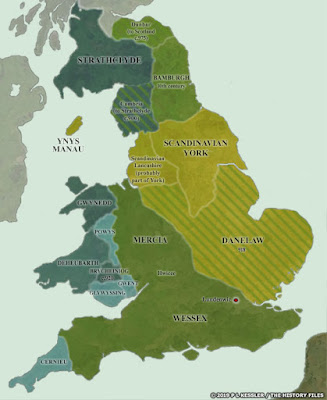Upon the death of Æthelstan (ruled 929 - 939 A.D.), power passed first to his brother Edmund (ruled 939-945 A.D.) and then to his other brother Eadred (ruled 945-955 A.D.). Their time was spent largely working both to consolidate their control of the Dane law as well as trying to conquer - or reconquer - the Norse Kingdom of York (Old Norse: Jarvik). Twice during the reign of Eadred it was briefly reconquered and twice it was retaken by the Norse ( by the renowned former King of Norway Eirik Haraldsson, more charmingly known as Eirik Bloodaxe) until in 954 A.D., Eirik was expelled (read "killed") and the kingdom of York incorporated into Anglo-Saxon England. Eadred himself died a year later, king of "all England".
(Britain 900 - 950 A.D. Source)
Rule of Anglo-Saxon England then passed to the son's of Eadred's brother Edmund's sons, who were both minors at his death. The first Eadwig, was likely 15 years old at the time of his accession and reigned only four years (ruled 955 - 959 A.D.) in total, two of those having to split the kingdom with his brother Edgar along the line of the Thames. The verdict on Eadwig as a king remains a matter of discussion: the records of his reign are not conclusive and a likely quarrel with the church hierarchy may have giving him the proverbial "bad press". Upon Eadwig's death, his brother Edgar became sole ruler.
Edgar (ruled 959 - 975 A.D.) has come down to us in history as "Edgar the Peaceable". Edgar himself is a bit of a mystery to us, as we have so very little information about him: there are only 10 entries related to him during his reign in the Anglo-Saxon Chronicle.
Why was he the Peaceable? Part of it was an accident of history: the Viking raids and interventions that had been a part of the preceding 100 years did not occur during reign (although quite likely having little enough to do with Edgar himself). He promulgated two revisions of the law codes, focused more on execution of the law than administrative and recognizing the different legal practices of the former kingdom of York (keep in mind the Danelaw had its own recognition as well). He reformed coinage. But his largest contribution to Anglo-Saxon England was supporting church reform, moving the Anglo-Saxon church from a secular clergy to that of a monastic clergy, largely that of the Rule of St. Benedict (The Benedictines). The movement also sought to vigorously reform the existing monasteries. He also continued the work of Alfred the Great in terms of supporting writing and literature; in some ways his reign is considered the height of Anglo-Saxon literature, art, and culture. And while there were no Viking invasions and only a few conflicts with neighbors to the North and West, the fleet started by Alfred the Great had grown into what was referred to as a powerful navy under Edgar.
(One historical note of interest: It is recorded in 973 A.D. that 8 "kings" of Britain submitted to Edgar at Chester. One of these was the King of Scotland. In return for the submission, Edgar granted to Scotland district we now know as Lothian, too far to the north of England to be readily governable in those times. By this, Edgar essentially established what became the border between Scotland and England)
By the time of his death in 975 A.D., the Anglo-Saxon kingdom rested on a relatively even keel of peace, learning, religious reform, and prosperity - at least one historian has called Edgar's reign the apogee of Anglo-Saxon culture. Sadly, this was all about to come crashing down.
Sources:
Keynes, Simon and Lapidge, Michael: Alfred The Great: Asser's life of King Alfred and Other Contemporary Sources. Penguin: Great Britain, 1983.
Brooke, Christopher: From Alfred to Henry III 871-1272. Norton Library: USA, 1961.
Trevelyan, G.M.: History of England Volume 1: From the Earliest Times to the Reformation. Anchor Books: USA, 1953
Nicolle, David: Arthur And The Anglo-Saxon Wars. Osprey Publishing: Hong Kong, 1984
Heath, Ian: The Vikings. Osprey Publishing: Hong Kong, 1985
Harrison, Mark: Viking Hersir 793 - 1066 AD. Osprey Publishing: Hong Kong, 1993.
Wikipedia: Eric Bloodaxe, Eadwig, Edgar

Really liking this series TB, it fills in an area I was interested in ever since University.
ReplyDeleteWell, thank you very much Nylon12! It has been filling in a lot of my own history gaps as well. I had not intended this to become what it has, but I have become pretty happy with the outcome.
DeleteYou are starting to get into unfamiliar territory again, not covered by either of the Vikings television series.
ReplyDeleteEd, The Great Heathen Army was lead by Ragnar's sons, so likely we are passing out of the series. We probably do not catch up with a more potentially "media rich" period until 1066.
DeleteI have been trying to pare down some archive files, and came across an article that fits the theme here. Near the end is this curious statement: "What is clear is that the Irish, Scots and Welsh -- the Celtic ones who lost their languages -- ended up populating the British Empire and America out of all proportion to the English when adjusted for percentage." That the Celtic influence extends far from their local culture is remarkable. The article is still online here:
ReplyDeletehttps://www.americanthinker.com/articles/2015/04/two_underrated_peoples.html
Thanks for the link Greg! I did not that about the Basque at all.
DeleteModern folks mostly do not remember that the Celtic Civilization existed long before Greece or Rome expanded their empires. Theirs was a resilient culture that could accept outsiders but (for many years) maintain their own identity - or reassert it, as the Romano British demonstrated.
This post covers some unfamiliar historical territory for me. Interesting and much appreciated.
ReplyDeleteYou are quite welcome Leigh. Unfamiliar to me as well, which made it all the more interesting.
Delete